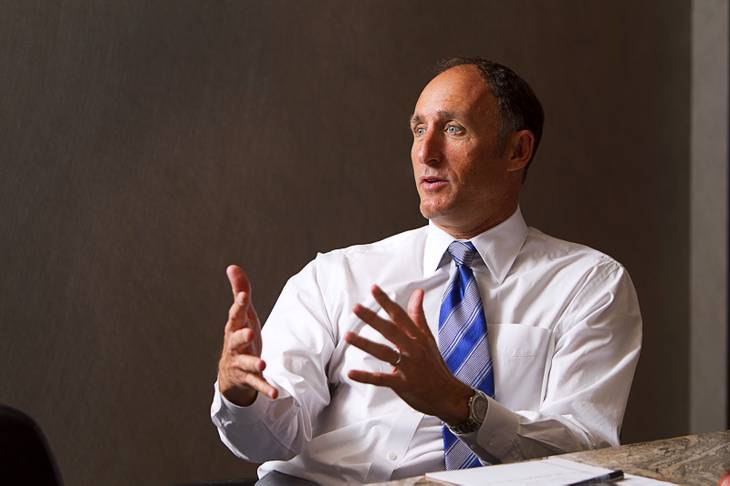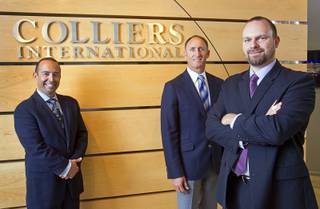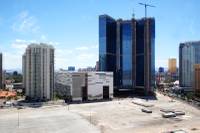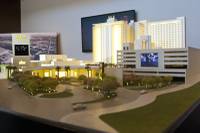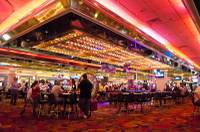Upwards of $1.5 billion will be invested in the Las Vegas gaming market over the next two years.
That’s Mike Mixer’s prediction.
Mixer is the head of a new national gaming group established last summer by commercial real estate brokerage Colliers International. The firm already is known as a major player in the hotel, industrial, office and retail sectors. Now, it is adding gaming to that list.
Mixer’s Las Vegas-based team includes longtime industry executives Josh Smith and Gabe Telles, who both most recently worked for Colliers’ competitor CBRE.
The investments Mixer and his team anticipate include new casino sales and updates, including the renovation of the Sahara into SLS Las Vegas, the transformation of Imperial Palace into the Quad, construction by Caesars Entertainment of the Linq entertainment promenade behind the Flamingo and the Quad, the redevelopment of Bill’s Gamblin’ Hall, the development of a Nobu Hotel at Caesars Palace and the redevelopment of the Lady Luck into the Downtown Grand.
Recent restructurings add to the forecast. They include creditors’ seizure of Hooters and the LVH and, most recently, lenders’ foreclosure of prime Strip land across from the Wynn that once was slated to be a Plaza hotel. The restructured real estate is expected to eventually be sold to a gaming company or developers.
The Colliers Gaming Group recently sat down with VEGAS INC to reflect on this year’s activity and project gaming trends for the future.
Why did Colliers create a gaming group?
Mixer: As we rebuilt the hotel program across the country, we realized the specialty of gaming is so unique and having the benefit of being based in Las Vegas, it was time to build a real gaming group.
Are you seeing more interest in Las Vegas from investors?
Mixer: The light switch was off in 2009 and 2010. As our visitor volume has rebounded to peak levels or near-peak levels, it’s a strong catalyst that begins the discussion. Seeing our occupancy level at a number that’s the highest in the nation with 151,000 rooms, that’s impressive.
Certainly our room rates have room to grow. And gaming revenue, convention attendance and air travel are all edging slightly positive. That’s going to bring demand from potential investors who feel it’s safe to come in now. They don’t feel the free fall. We’ve solidified ourselves, and we’re growing from here.
The intrinsic value of what you can pay today to acquire an asset is below the reproduction cost. Most experienced investors realize this is a situation ideal to come into a marketplace where you can buy an asset at a much lower cost than it is to replace it, rebuild it or reproduce it.
What are you projecting for Strip revenue growth in the next few years?
Smith: 2011 and 2012 were flat. We expect it to increase.
It might be a slow increase over the next five years. Visitor volume at its peak definitely helps, although we’ve seen less spending by visitors.
What do you predict for Echelon and Fontainebleau, the Strip’s largest unfinished resort projects?
Telles: A lot of things have to go right for Fontainebleau and Echelon to come into the picture.
We’re on this wave of investment in assets on the Strip. At the end of that, we’ll see about the performance of the Linq, the Quad, Bill’s, SLS and the LVH. We’ll see real dollars from them. Then, the conversation will pick up.
Will the Fontainebleau, owned by investor Carl Icahn, ever be finished?
Mixer: My projection is that it won’t be scrapped and will entice a new operator.
I keep pushing out my estimate on the timing. I think I’m two years out, and if you ask next year, I’ll probably still be two years out.
For someone who is contemplating a development, that presents the best opportunity to jump in the game without having to start something from the ground up. There’s $1.5 billion to $2 billion already in it. That’s going to have value for someone.
Carl Icahn saw that. I think he’s waiting for the market to catch up to his expectations, whatever those are. I think it will get there.
The former New Frontier land across from the Wynn is being foreclosed on with defaulted debt of $625 million. What do you expect to happen there?
Mixer: Depending on how beat up the lender is, it may take time for that lender to realize how far values have fallen and then sell it to someone for significantly less than $625 million. I assume the property will sit there for a while.
It’s a dynamite property. But to pencil any new development on the Strip today, even if the land is valued at zero, it’s difficult to turn a profit.
Will Sam Nazarian’s SLS succeed?
Mixer: It’s great for the market. It shows investment in tired properties and the ability to bring new life into them and hopefully to expand the market.
Sam Nazarian, in particular, brings a certain skill set to our market that will help them compete very well. They’re very strong in nightlife and club operations.
What will happen with the Riviera?
Mixer: The owner of the Riviera has embraced its old Las Vegas persona and hasn’t tried to renovate it for the sake of renovation. It is going to take time, and it has a way to go.
I suspect they’ll wait to see how the current level of investment performs. If they get traction, I suspect they’ll continue to invest and look at that property as a long-term hold.
At LVH, we think we’ll see a significant level of investment there. It literally can’t survive without it. That’s an asset that’s ripe for fresh investment and energy.
There’s a tremendous amount of vacant land on Las Vegas Boulevard between the M Resort and South Point. What do you see happening there?
Mixer: I think something will happen there someday. It has a tremendous amount of contiguous acreage that, in most major cities, is difficult to come by.
When investors come looking for 100 or 200 acres for a project, there aren’t many available, and that property gets discussed frequently.
But the dollars and cents for a large-scale project in this market just don’t come to be. I think we’ll continue to be talking about it for some time.
Do you see anyone building another locals casino soon?
Mixer: Station Casinos owners coming back in and buying into their original company is a big vote of confidence in the locals market. The same with Penn National Gaming buying the M Resort.
Quality properties that target the local demographic will start to emerge as leaders as the economy improves. Some smart investors are starting to recognize that. But I don’t think we’ll see new construction soon in the locals market.
Are you excited about downtown?
Mixer: I love the energy that Tony Hsieh’s group is creating.
Smith: If you look at what Derek Stevens has done at the D and the Golden Gate, it shows more investment in the area. Obviously it pencils out if he’s able to put that amount of money into it.
Will the Downtown Grand be the last hotel addition downtown for a while?
Mixer: Yes. I think developer Seth Schorr and his partners are showing they can grow the market and offer new experiences that aren’t there.
Your group is involved in research with UNLV on online gaming. Why do commercial real estate executives care about Internet gambling?
Smith: We’ve had a lot of groups come to us — government officials, lobbyists, law firms, gaming operators — with questions. It will provide another channel of revenue for these companies so they can reinvest in their brick-and-mortar business.
It will benefit us indirectly. When you’re in that environment playing poker at home, you don’t have the showgirls and the amenities. You still have to come to Las Vegas for that. You don’t have that Las Vegas experience until you actually step on our soil. We think it will attract more visitors and be another marketing piece.
Mixer: The companies with brick-and-mortar casinos here can use that opportunity to build rapport and brand loyalty and give players reward points they can cash in when they come here. That will broaden the market for them. It is going to be a significant revenue component.
Penn National Gaming has announced plans to create a real estate investment trust to hold its real estate and another company to lease properties for casino operations. How will that work out?
Mixer: REITs play a major role in the disposition and acquisition of properties around the country. They provide a level of capital and a cost of capital that is really unique. They fill a big role in moving capital around and taking advantage of opportunities.
For some of the properties that have tried to hang on or are ready to move to the next level but need more investment to get there, REITs offer that opportunity.
For someone to refine that way of doing business and to focus on the gaming side of the market is a smart move.
